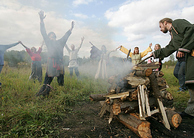Milk and Honey: How the Old Testament Speaks to a People in Exile
By
2009, Vol. 1 No. 11 | pg. 1/1 Mortal glory is fleeting. The Old Testament generally does not concern itself with militant triumph or climactic discovery. It much rather prefers to employ “legends, folktales, artfully constructed stories, and the like”1 to spin a web of frustration and disappointment. Taken as a whole unit, it is a product of the post-exilic period2, for even its oldest pieces underwent editing to suit the purposes of authors addressing an audience during the Babylonian exile3. And so it sought to form a bond of struggle, and it succeeded, as “Judaism flourished in exile…”4; people were not to emerge flexing their muscle, but to awaken to an ancestral universe, a dimension of sorrow and hope that would become their destiny. The Old Testament sought to unify the Hebrew people in a tradition of journey toward and search for God-given homeland, in a path ending in peace and comfort in God’s arms. A PromiseGod begins with a bestowal. And it is no small thing; in a land of mostly desert, where people scramble towards river basins and huddle there in clusters, God gives to his chosen people a seaboard strip of semi-arid hill country in western Palestine (Miller 2001, 245), something of an oasis in the landscape of bleak dryness surrounding it. The Hebrews are indeed privileged to be receiving this earth, which God vividly describes in Exodus as “a good and broad land, a land flowing with milk and honey” (3:7-8). This most palpable vision, a tantalizing weaving of geographic fact with the imagination of a deprived people, serves almost to force closed the eyes of the Hebrews in exile under the Assyrians and Babylonians, to force unto them memories theirs only by ancestry, yet so real as to settle like taste on the tongue. The repeating of the phrase suggests an authorship that knew it had convincing to do, and certainly that knew that the exiled Israelites and Judeans would have to fight and claw—always on the side of God—for this land (that is, compilers likely witnessed or experienced exile themselves [Brettler 2007]). After all, what was there to keep the scent of milk and honey from wafting towards other peoples of the region?But while the physical features of the land probably to some degree incited the covetous yearning of surrounding rulers, more bewitching still was the beauty of its position: it was the land bridge connecting the imperial powers of Egypt and Mesopotamia (Miller 2001, 245). Israel therefore could not escape conflict; it seems its people barely had time to unpack their bags and enjoy their gift before they were again uprooted. In Genesis 12:1, God assures Abraham that “I am your shield,” that there is no reason to fear; and indeed, with these foreign, ambitious armies stomping through and over the woefully inept Kingdom of the Hebrews, the people could ward off discouragement only by keeping faith, by remembering that “though politically insignificant, Israel will survive by the power of its God” (notes on Isa 41:11-16). The inclusion of chronicles of war and exile might be interpreted, then, as impetus; the Hebrews were to react with something like indignation, for this is God-given earth, this is holy earth. An encroachment on the land was an encroachment on God, which surely could not be tolerated. In Genesis 31:3 the Lord says to Jacob, who is in Mesopotamia, far from home, “Return to the land of your ancestors and to your kindred, and I will be with you”—it is a simple, unadorned statement, “and I will be with you,” but it is fraught with power. Later in the post-exilic Book of Isaiah, the Israelites are often called “Jacob,” after the same, because his “exile in Mesopotamia and return to the homeland mirrors the experience of the deportees and later Judeo-Babylonians who came back to Judah” (notes on Isa 41:11-16). It was crucial for the authors to establish the bond between the exile and the ancestor, the unique tie between the land and the God. It seems they were not content with an attitude of “easy come, easy go”; they were not content with exile. The Hebrews must recognize their sacred geography, a concept absent from most other religions at the time, and conveniently so—for no people will fight as fiercely as those with the righteousness of God burning in their bellies. But the promise does not come free. For a society essentially operating under a covenant, “a social novelty…introduced to the world, a community founded on nothing other than faith and loyalty”5, unity can be achieved only by strict adherence to the Law. The biblical scholar Mellhausen asserted that the covenant, the requirement for absolute service under the threat of revocation of all privilege, “provided the very foundation upon which Israel’s most distinctive religious ideas were built”6. It is this base that the Old Testament authors seek to build upon, this spirit of common purpose that they seek to elicit. If the first step was re-implanting nostalgia for homeland and legitimizing ownership of such, the next step was re-cultivating a fear of God, a need to earn his love and reap the benefit. It is not so difficult to imagine the exiled people of Israel, battle-worn and battle-weary, beaten, displaced again and again; it is not difficult to imagine their eager willingness to fall before this God of their ancestors, the God who freely reveals it was he who allowed for their exile (Isa 43:27-28), but who will now forgive them and lead them home (Isa 43:25-26). Submission emboldens the people. Servitude liberates them. As written in the “Exodus Introduction” in The New Oxford Annotated Bible, “the change of masters makes all the difference. Additionally, Israel was forced to serve Pharaoh”—in the case of the exiles, this extends to Assyria and Babylon—“while it freely decides to serve the Lord”7. This phenomenon of fulfillment of promise via duty to God combined with the dynamic in the prophetic books whereby God lifts his people in and out of their homeland as he sees fit “permits the daring assertion in the Exile that the God who ‘plucks up and tears down’ will also ‘build and plant’ a new covenant people” (Brueggeman 2001, 676). It is for this reason the Old Testament begs attention, for this reason it urges obedience: that the people might renew the covenant of old and reclaim their God-given homeland with clarity of realization, in peace with God. The WildernessA people doomed or destined to wander far from home for much of their history must have assurance if they are to be won over. They will not last trudging across empty expanses of Godlessness; it is too far, too long; they must know that even as they “walk through the valley of the shadow of death” they need “fear no evil” (Ps 23:4). For on their epic journey, their exhaustive search for homeland that sweeps like a Mayan clock across the face of history, the Hebrews face the wilderness, daunting and terrifying. But even there, God dwells. He is a God, as Jacob attests, “who answered me in the day of my distress and has been with me wherever I have gone” (35:3). His influence is not confined to Jerusalem or to places of light. He protects his people struggling with every manifestation of the dark, vast wilderness. The exodus is most critical to the people’s trust in God in moments of darkness. As Pharaoh’s men pursue the fleeing Israelites, closing ground with each passing second, it is safe to imagine hat the refugees know a fear and panic as deep and airless and unknowable as the farthest reaches of space. And we see that God may dispel the wilderness however he so pleases. He may fight cloudiness with cloudiness, terror with terror, as in 14:19-20: “The angel of God who was going before the Israelite army moved and went behind them; and the pillar of cloud moved from in front of them and took up its place behind them. It came between the army of Egypt and the army of Israel.” And he may also light a candle, provide calm and comfort in deafening silence or wailing chaos, as in 14:28-29: The waters returned and covered the chariots and the chariot drivers, the entire army of Pharaoh that had followed them into the sea; not one of them remained. But the Israelites walked on dry ground through the sea, the waters forming a wall for them on their right and on their left. What a relief for exiles embarking on a long and taxing journey, that the heart of darkness is no match for the God who guides their way. The wilderness need not be only figurative; in fact, just as the elusive hills of Palestine are quite literal, so are the sands of the desert—far more expansive and easier to come upon. In Exodus once again, God uses extraordinary means to quell the growling stomachs (16:4) and satisfy the parched tongues (17:6) of the complaining Hebrews. Second Isaiah alludes to this episode: When the poor and needy seek water, There is emphasis here on the Hebrews as the downtrodden. In Hebrew identity there exists always a balance between promise and wilderness, between fulfillment and suffering; this is reflected especially in Isaiah, wherein “the description of affliction and persecution sit right alongside language bursting with hope and promise”8 The diasporas community of the post-exilic period knew something of the disorientation of being in an alien land far from home (and maybe therefore far from God—a wilderness in its own sense), likely even more so than the other inhabitants of the Hellenistic melting pot. For Hebrew origins, cultural and geographical, had been woven with such care and concentration. It seems that they did not belong here, that the fact of their presence here was some sort of cosmic accident. God appears to concur, and he hears the despair of the displaced over any distance. In Deuteronomy God promises that “Even if you are exiled to the ends of the world, from there the Lord your God will gather you, and from there he will bring you back” (30:4-5); the note on these verses is that they were addressed specifically to the Hebrew peoples exiled in Babylon, rather than to those of the “desert generation” of Moses. Here is an overt and proven attempt to reckon the occurrence of bygone legend with current state of being, and to channel this into the formation of unified identity. The God of post-exilic Isaiah makes similar claims: Do not fear, for I am with you; The frequency with which God mentions his intent to gather his exiled people, in strong gale or perhaps the way a magnet lifts paperclips, suggests not only that a scattered state is an undesirable one, but that it is as inevitable as leaves in the wind. This is why the struggle is permanent; this is how the promise remains a possibility. RememberWhen the authors and compilers of the Old Testament set Judaism up to last, it is doubtful they anticipated 2500 years of persecution and oppression; it is unlikely they foresaw how real exile would become. But the Old Testament has followed these people. It has not gone away. “Introduction to Genesis” in The New Interpreter’s Bible reads, “The various stories of the ancestors often seem to mirror the history of Israel, assisting the exiles in coming to terms with their own past... These texts spoke a clear word of God to exiled people”9. Perhaps that is what is happening now: Israelis are honoring the struggles of the past by eschewing the role of victim. But in this time and place their sacred geography is not unique; God has met God--the mission has stalled. For while God may have spoken clearly to the ancient exiles, in this time and place of glorious fulfillment it seems doubtful he gets a word in edgewise. 1.) J. Maxwell Miller, “Introduction to the History of Ancient Israel,” The New Interpreter’s Bible Vol. I (2001): 253 2.) Encyclopedia Biblica (1914) 3.) Marc Z. Brettler, “Introduction to the Pentateuch,” The New Oxford Annotated Bible (2007) 4.) John J. Collins, “Introduction to Early Jewish Religion,” The New Interpreter’s Bible Vol. I (2001): 284 5.) Walter Brueggemann, “Introduction to Exodus,” The New Interpreter’s Bible Vol I. (2001): 679 6.) Cited in Gary A. Anderson, “Introduction to Israelite Religion,” The New Interpreter’s Bible Vol. I (2001): 276 7.) Judith E. Sanderson, “Exodus: Introduction,” The New Oxford Annotated Bible (2007): 83 8.) Christopher R. Seitz, “Introduction to Isaiah 40-66,” The New Interpreter’s Bible Vol.VI (2001): 321 9.) Terence E. Fretheim, “Introduction to Genesis,” The New Interpreter’s Bible Vol.I (2001): 327 Suggested Reading from Inquiries Journal
Inquiries Journal provides undergraduate and graduate students around the world a platform for the wide dissemination of academic work over a range of core disciplines. Representing the work of students from hundreds of institutions around the globe, Inquiries Journal's large database of academic articles is completely free. Learn more | Blog | Submit Latest in Theology |











